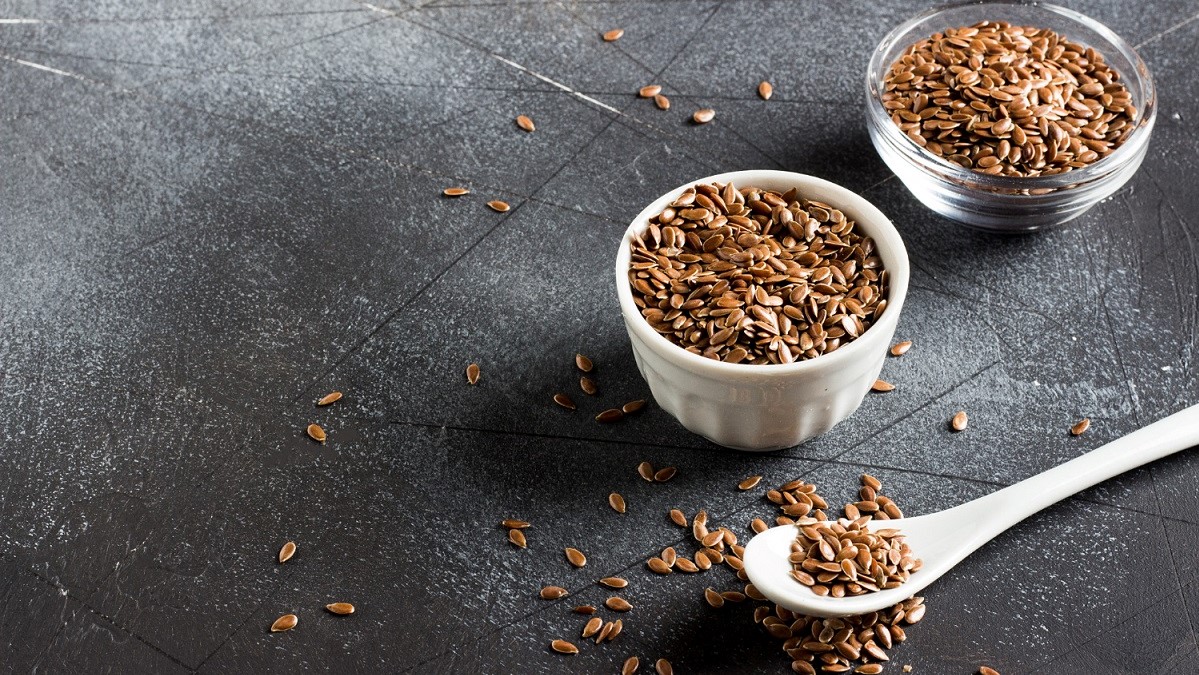If you are looking for a protein-rich diet, include flax seeds in your menu. Rich in protein and omega-3 fatty acids, flax seeds not only help you lose weight but also have several other health benefits. The key benefits of flaxseeds include maintaining a healthy weight, reducing the risk of cancer, cholesterol, and several other diseases, lowering blood pressure, and more.
Here are the matchless health benefits of flaxseed that are backed by science, along with some easy tips to increase your intake.
Why flax Seeds?
Flaxseed is a small oil seed that is highly nutritious in content. Flax seeds are a good source of omega-3 fatty acids, lignans, and fibre. They may help reduce the risk of heart disease, lower cholesterol and blood sugar levels, and promote regular bowel movements. They may also have cancer-fighting properties and help with weight management.
Health benefits of flax seeds
Researchers state that the health benefits of flax seeds are umpteen because of its high fibre, omega-3 fatty acids, protein, and anti-oxidant content. Apart from promoting weight loss, flax seed is beneficial for preventing the risks of diabetes, cholesterol, heart diseases, certain cancers, and several other diseases. Given below are the some of the key benefits of flax seeds to must know.
Flax seeds for weight loss
Flax seeds may be beneficial for weight loss due to their high fibre content and ability to promote feelings of fullness. The fibre in flax seeds can absorb water and expand in the stomach, which can help reduce appetite and decrease overall food intake. Additionally, the lignans in flax seeds have been shown to have a beneficial effect on weight management by helping to regulate hormones related to metabolism and hunger. However, it is important to note that flax seeds should be used in combination with a healthy diet and regular exercise for optimal weight loss results.
Flax seeds may help with weight loss in several ways. First, they are high in fibre, which can help promote feelings of fullness and reduce overall calorie intake. Additionally, the omega-3 fatty acids found in flax seeds may also help with weight loss by increasing the metabolic rate and reducing inflammation in the body. However, it is important to note that adding flax seeds to your diet alone may not lead to significant weight loss. A healthy diet and regular exercise are still necessary for weight loss. Additionally, speaking to a healthcare professional before making any dietary changes is always recommended.
Find Some, Healthy Indian Breakfast for Weightloss
Reduce blood pressure
Flaxseed is popular for its fibre and nutritional content, and hence for its ability to lower blood pressure as well. If you are suffering from high blood pressure, consume flaxseed regularly to control your blood pressure level. Keep in mind that you are supposed to stop your medicine for pressure unless your doctor tells you to do so. Flaxseed and other similar plant-based health ingredients can only help stabilise or control your disease level, and cannot cure it completely.
Protection against cancer
Lignans, a plant compound in flaxseed, are researched for their potent cancer-fighting properties. Flaxseeds have more lignan content than other plant foods, and some studies suggest that the intake of flaxseeds can lower the risk of certain cancers, such as breast cancer. More research is being conducted in this field to ascertain the health benefits of flaxseeds in cancer prevention.
Support Digestive Health
The daily intake of flax seeds, rich in fibre content, supports digestive health. One of the key health benefits of flax seeds is their high fibre content, which helps to prevent constipation, manage weight, make you feel full quickly, improve bowel movements, and more.
Lower your cholesterol level
Research testimony that studies conducted in people with peripheral artery disease, eating flaxseed per day showed decreased levels of bad cholesterol. This is due to the fibre content in flaxseed. The fibre in flaxseed binds to bile salt before getting excreted from your body, and to refill these bile salts, cholesterol is drawn from the body into the liver, thereby lowering the levels of cholesterol.
Stabilise blood sugar level
Flaxseed is known to control and stabilise blood sugar levels. Studies reveal that flaxseed has the potential to prevent insulin resistance and regulate blood sugar levels with its soluble fibre content. The soluble fibre content in flaxseed slows the absorption of sugar in the blood. Due to the health benefits of flaxseed, it is recommended for type 2 diabetes patients. However, whole or ground flaxseed is suggested rather than flaxseed oil, as the oil lacks fibre content.
Helps to improve your PCOS
Since flaxseeds are an excellent source of omega-3 fatty acids and fibre content, they are known for their benefits in controlling polycystic ovarian syndrome. The lignan, fibre, and antioxidants in flaxseed are beneficial to improving your hormone levels, thereby managing your PCOS. The benefits of flaxseeds in your PCOS diet include regulation of hormone levels, reproductive health, control of cyst growth, etc.
May reduce skin inflammation & improve skin health
The lignans and antioxidants present in flaxseed reduce wrinkles and maintain the elasticity of the skin. Flaxseed is not just packed with nutritional benefits when consumed regularly; it also promotes beauty benefits, when applied to the body. Because of its high anti-inflammatory omega-3 content, it can reduce inflammation in the skin and improve the healing effect on the skin. Skin experts suggest flaxseeds for their anti-ageing benefits, removing skin dryness, and keeping the skin hydrated.
Nutrition
Flax seeds are loaded with several nutrients. About four tablespoons of flax seeds contain rich nutrients, including
- Calories: 224
- Fat: 17.5g
- Carbohydrates: 12g
- Sodium: 12.6mg
- Fiber: 11.5g
- Iron: 2.4mg
- Added sugars: 0g
- Protein: 7.7g
- Magnesium: 165mg
- Thiamin: 0.69mg
- Selenium: 7.12mcg
Tips for consuming flaxseed
Experts suggest using whole flaxseeds or ground flaxseed rather than flaxseed oil, which is low in fibre content. The optimal dose to get the health benefits is not known. But you may consume 1 to 2 tablespoons of ground flaxseed daily to obtain optimum benefits.
You can add ground flaxseed to your
- Breakfast cereals
- Shakes and smoothies
- Oatmeal, soups and stews
- Salads and sandwiches
- Yogurts
Summary
The health benefits of flaxseed are umpteen, as it is rich in antioxidants, lignans, protein, fibre, and other plant-based ingredients. The daily consumption of flaxseeds will aid weight loss, stabilise blood pressure and sugar, regulate hormonal imbalances, improve digestion, control cholesterol, promote skin health, and more. However, consuming large amounts of flaxseed on a daily basis, on the other hand, can cause digestive issues and allergic reactions in rare cases. So include these tiny seeds in your diet in a limited quantity. Talk to your dietician or nutritionist to know more about the health benefits of flax seeds and how to include them in your diet for maximum benefit.



